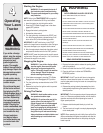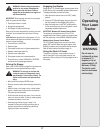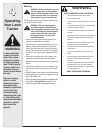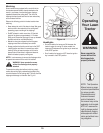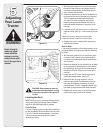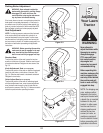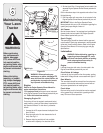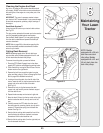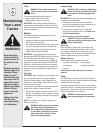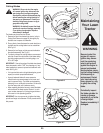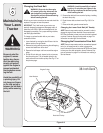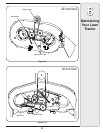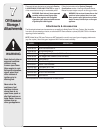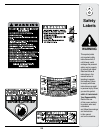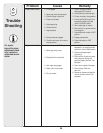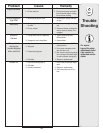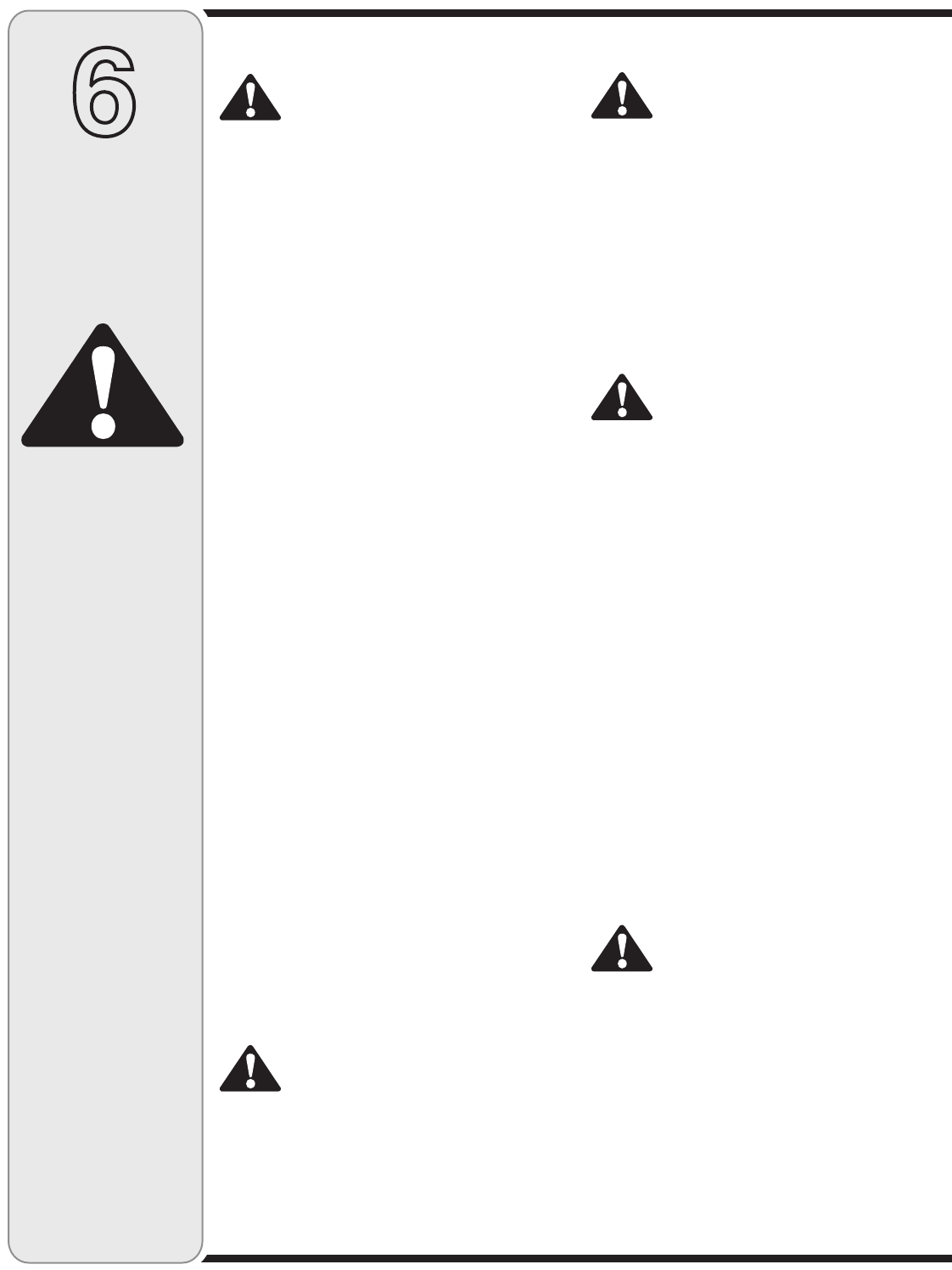
24
6
Maintaining
Your Lawn
Tractor
Tires
WARNING: Never exceed the maximum
inflation pressure shown on the sidewall
of tire.
The recommended operating tire pressure is:
• Approximately 10 psi for the rear tires
• Approximately 14 psi for the front tires
IMPORTANT: Refer to the tire sidewall for exact tire
manufacturer’s recommended or maximum psi. Do not
overinflate. Uneven tire pressure could cause the cutting
deck to mow unevenly.
Battery
The battery is sealed and is maintenance-free. Acid
levels cannot be checked.
• Always keep the battery cables and terminals clean
and free of corrosive build-up.
• After cleaning the battery and terminals, apply a light
coat of petroleum jelly or grease to both terminals.
• Always keep the rubber boot positioned over the
positive terminal to prevent shorting.
IMPORTANT: If removing the battery for any reason,
disconnect the NEGATIVE (Black) wire from it’s terminal
first, followed by the POSITIVE (Red) wire. When
re-installing the battery, always connect the POSITIVE
(Red) wire its terminal first, followed by the NEGATIVE
(Black) wire. Be certain that the wires are connected to
the correct terminals; reversing them could change the
polarity and result in damage to your engine’s alternat-
ing system.
Charging
IMPORTANT: When charging your tractor’s battery, use
only a charger designed for 12V lead-acid batteries.
Read your battery charger’s Owner’s Manual prior to
charging your tractor’s battery. Always follow its instruc-
tions and heed its warnings.
If your tractor has not been put into use for an extended
period of time, charge the battery as follows:
• Set your battery charger to deliver a maximum of 10
amperes. If your battery charger is automatic, charge
the battery until the charger indicates that charging is
complete.
NOTE: If the charger is not automatic, charge for no
fewer than eight hours.
WARNING: Batteries give off an explosive
gas while charging. Charge battery in a
well ventilated area and keep away from
an open flame or pilot light as on a water
heater, space heater, furnace, clothes
dryer or other gas appliances.
Jump Starting
WARNING: When removing or installing the
battery, follow these instructions to prevent
the screwdriver from shorting against the
frame.
IMPORTANT: Never jump your tractor’s dead battery with
the battery of a running vehicle.
1. Connect end of one jumper cable to the positive
terminal of the good battery, then the other end to the
positive terminal of the dead battery.
2. Connect the other jumper cable to the negative
terminal of the good battery, then to the frame of the
unit with the dead battery.
3. Start the tractor as instructed on page 15.
WARNING: Failure to use this procedure
could cause sparking, and the gas in either
battery could explode.
Cleaning
Clean the battery by removing it from the tractor and
washing with a baking soda and water solution. If neces-
sary, scrape the battery terminals with a wire brush to
remove deposits. Coat terminals and exposed wiring with
grease or petroleum jelly to prevent corrosion.
Battery Failures
Some common causes for battery failure are:
• incorrect initial activation • undercharging
• overcharging • corroded connections
• freezing
These failures are NOT covered by your tractor’s
warranty.
Fuse
One 20 AMP fuse is installed in your tractor’s wiring har-
ness to protect the tractor’s electrical system from damage
caused by excessive amperage.
If the electrical system does not function, or your tractor’s
engine will not crank, first check to be certain that the fuse
has not blown. It can be found under the hood mounted
behind the dash panel on the right side.
WARNING: Always use a fuse with the
same amperage capacity for replacement.
WARNING
Never exceed the
maximum inflation
pressure shown on
the sidewall of the
tire.
Batteries give off an
explosive gas while
charging. Charge
battery in a well
ventilated area and
keep away from an
open flame or pilot
light as on a water
heater, space heater,
furnace, clothes
dryer or other gas
appliances.
Always use a fuse
with the same
amperage capacity
for replacement.



